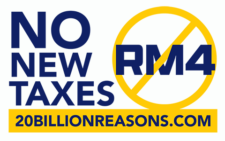What is RM4?
RM4 stands for “Regional Measure 4.” It is a proposed new tax that will be on the November 5, 2024, ballot to raise property taxes $48.3 Billion in the nine Bay Area counties (that’s why it is called “Regional”).
Who has to pay the new tax – and for how long?
Homeowners will have it added to their property tax bills. Renters will see their rents rise as landlords who pay the tax pass on the cost. Small businesses will see their lease costs increase, too. The tax is planned to last for 53 years.
How do I vote on RM4?
You must be registered to vote in one of these counties: Alameda, Contra Costa, Marin, Napa, San Francisco, San Mateo, Santa Clara, Solano, or Sonoma. You can register on line until October 15. Then vote by mail or in person on November 5. More information is here: https://vote.gov/register/california
Are there any exemptions for seniors, those on disability, or those in need?
No, there are no exemptions whatsoever. Everyone pays, including seniors on fixed income, disabled residents, and those in need.
How long will this tax increase last?
This is a 53-year-long debt obligation, which is an unusually long time period. So the tax will be collected until 2078. This 53-year-long bond duration is like taking out a mortgage for 53 years. Most people wouldn’t do that because the interest paid is so high when the duration is so long. In the case of RM4, 59% of the $48.3 billion in tax is paid to bond investors in the form of interest expense.
Is this the last tax MTC (the regional agency asking for this) will ask of us?
No. They are planning on a subsequent transit tax in 2026 to fund their operating subsidy shortfalls. And even more taxes may be required to pay for the maintenance and repairs for any housing they may build with the RM4 bond tax.
What has been the track record of taxpayer money used for housing in california? Would this bond tax be any better?
California has invested $24 billion to fight homelessness in the past five years, yet the money is unaccounted for, and homelessness has increased dramatically. Given this regional agency (MTC) has a poor track record in their core mission of providing surface transportation, it is hard to imagine expanding their scope will suddenly result in success.
What guarantees are there regarding construction of affordable units?
There are no guarantees whatsoever. The only guarantee is that $48.3 billion of extra taxes will be assessed upon residents in the 9-county Bay Area. The agency overseeing this has no promises or commitments regarding exactly what, if anything, will be built. It is a blank check.
If housing units are built using the RM4 bond, would only those in need qualify for subsidized housing?
No. People making 120% of Average Median Income will qualify. That means, for example, a family of four making $180k/year could qualify for an RM4-subsidized housing unit, paid for by other taxpayers who may be earning less money.
Should I be confident the money be well spent since MTC says there will be independent citizen oversight?
No. First, MTC decides WHO will oversee them, which is an obvious problem. Second, the oversight committee has no authority over how the money is spent. It only looks at what was spent in the past with very limited authority. The oversight claim is giving voters a false sense of security and should not be relied upon.
